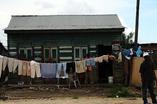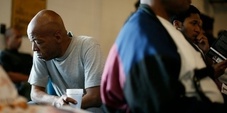Many power brokers believe in the myth of their own “fitness”It is human nature, as strongly indicated by social psychology research, that those in power more readily consider themselves to be individuals who deserve their good fortune simply by virtue of belonging to the inner circle of wealth and influence. However, in most cases they did not pull themselves “up by their bootstraps” or attain success because of superior qualities of “ruggedness” or “rationality".
Findings from social psychology experiments have underscored the tendency for actor-observer bias. All of us tend to attribute our good fortune to our own merit, and the misfortune of others to their flaws or incompetence. Most successful people were given many a boost: educational, financial and social— coming in many forms: investors, mentors, patrons, family resources, advice and counsel, invitations to the right clubs and events, opportunities for schmoozing and networking. They also have better access to loans, investments, allowances, dividends, rebates, etc. People maintain their positions with the help of countless back-ups: assistants, secretaries, housekeepers, nannies, and the spouses who create smoothly running households and track all aspects of family life. We take our shared bounty for grantedOn a wider scale, a large percentage of people living in wealthy and stable nations take for granted the many services in place that ease daily life and provide opportunities for flourishing beyond mere subsistence.

Poverty Lowers IQ: How Financial Strains Put Pressure On Cognitive, Logical Reasoning
From www.medicaldaily.com - August 30, 2013 Poverty can sap a person's mental resources, lowering his or her IQ and impairing the individual's impulse control. 
How Poverty Taxes the Brain
From www.theatlanticcities.com -August 29, 2013: Scientists have discovered that being poor actually impairs our cognitive abilities. 
Poverty saps mental capacity to deal with complex tasks, say ...
From www.theguardian.com -October 1, 2013 Study suggests being preoccupied with money problems is equivalent to loss of 13 IQ points or losing a night's sleep. 
How poverty depletes brain power
From www.deseretnews.com -October 31, 2013 New research shows that poverty itself may use up people's limited mental bandwidth, causing them to make worse decisions that contribute to their poverty. 
What Poverty And Insomnia Have In Common
From bigthink.com - August 30, 2013 What's the Latest Development? A study published this week in Science describes experiments done on two groups of people to determine how the mental stresses associated with poverty affected their decision-making. 
Your Brain on Poverty: Why Poor People Seem to Make Bad Decisions
From www.theatlantic.com - November 22, 2013 Shoppers at a food pantry. (Reuters)In August, Science published a landmark study concluding that poverty, itself, hurts our ability to make decisions about school, finances, and life, imposing a mental burden similar to losing 13 IQ points. It... 
How Poverty Takes Over the Mind
From www.bloomberg.com -November 27, 2013 Suppose you got no sleep last night and you have to take an intelligence test today. If you’re like most people, you’re not going to do so well on that test. 
Feeling powerless increases the weight of the world... literally
From medicalxpress.com - February 4, 2014 Scientists have found that people who feel powerless actually see the world differently, and find a task to be more physically challenging than those with a greater sense of personal and social power. Making Decisions Under the Influence of Poverty
From www.slate.com - July 28, 2014 Your Brain on Bandwidth Poverty. The Gist discusses how a lack of money, time, and attention can affect the way we make decisions. The Mermaid's Tale: The fluidity of fluid intelligence
From ecodevoevo.blogspot.com - March 27, 2014 If IQ is a measure of some aspects of intelligence, and intelligence is the product of a gene or genes, then it should follow that IQ is a stable trait during an individual's lifetime. So I was interested to hear on a recent episode of the BBC radio program,Analysis, that IQ can change even over the course of participation in a brief psychological study. Princeton professor of psychology and public affairs, Eldar Shafir, co-author of the book, with economist Sendhil Mullainathan, "Scarcity: Why Having Too Little Means So Much", was interviewed on the program about how having too little time or money influences our lives. Mullainathan and Shafir believe that experiencing scarcity changes the way we think, and makes a bad situation even worse; poverty creates a "scarcity mind-set" and causes poor people to make bad decisions, which perpetuates their poverty. To test this, they interviewed people shopping in a mall in New Jersey, determined their financial status, presented them with various financial scenarios and then asked them to play computer games that measured their 'fluid intelligence', a component of IQ that indicates things like the ability to think logically, to reason, or to handle novel situations. 
The Great IQ Depression
From westhunt.wordpress.com -March 8, 2014 We hear that poverty can sap brainpower, reduce frontal lobe function, induce the fantods, etc. But exactly what do we mean by ‘poverty’? |
|
- Home
- Overview
-
Understanding Hate
- Introduction
- What is Hate? >
-
The Roots of Hate
>
- Early Imprints >
- What Are We Doing To Our Children? >
- Effects of Trauma and Abuse >
- Causes and Effects of Bullying
- Trauma, bigotry, violence linked
- Authoritarian Upbringings >
- Absolutism and Insularity >
- Papers: Early Roots of Prejudice
- Impaired Cognition >
- The Violent Brain >
- Roots of Violence and Cruelty >
- Ghosts of the Past >
-
How Hate Manifests
>
- Hate in the News >
-
Group Influence
>
- Social Defenses >
- Fanning the Flames >
-
How We Fool Ourselves
>
-
Brain and Belief
>
- Search for Certainty >
- Index: All Biases, Distortions and Influences
-
Overcoming Hate
- Overview of Topics
- Introduction
-
Prevention
>
- Education >
-
Intervention
>
- Social Support and Inclusion >
- Helping Children in Dire Conditions >
- Preventing Violence and Bullying >
- Standing Up To Prejudice, Racism, and Bigotry >
- Training Our Protectors >
- Healing the Hurt >
- Educating Our Leaders >
- Resolving Conflict >
- Israel-Palestine >
- Promoting Dignity >
- Healing the Ghosts of the Past >
- Restorative Justice >
- Confronting Mass Atrocities >
- Social Advances >
- More Solutions >
-
Resources
- Tools




